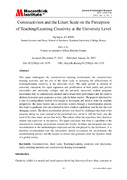Constructivism and the Likert Scale on the Perception of Teaching/Learning Creativity at the University Level
Abstract
This paper interrogates the constructivists learning environment, the constructivists learning activities and the use of the likert scale in assessing the effectiveness of teaching/learning creativity at the university level. The rapid growth in demand of university education, the rapid expansion and proliferation of both public and private universities and university colleges and the privately sponsored student programs necessitates that we continuously monitor and evaluate their performance and the creative abilities bestowed upon graduates as they join the labor market. The paper is informed by a case of a postgraduate student who sought to investigate and analyze from the students perspective, the input factors into a university system through a transformation process that leads to graduates who are expected to have creative capabilities and fit into the ever changing society. The thesis examination process was faced by challenges that lead to the program taking six years instead of the prescribed two, yet he is still the lucky one, the most of his class mates are not that lucky. The authors relate the experience they shared as student and supervisor in the process. The paper concludes that there is a problem in the constructivist learning environment created-the faculty, facilities and programs and also dissatisfaction in the methodologies employed and the role played by the facilitators. It is therefore recommended that the universities should re-examine the environment, the transformation process and the outputs to ensure that graduates meet the dynamic needs of a global society.
